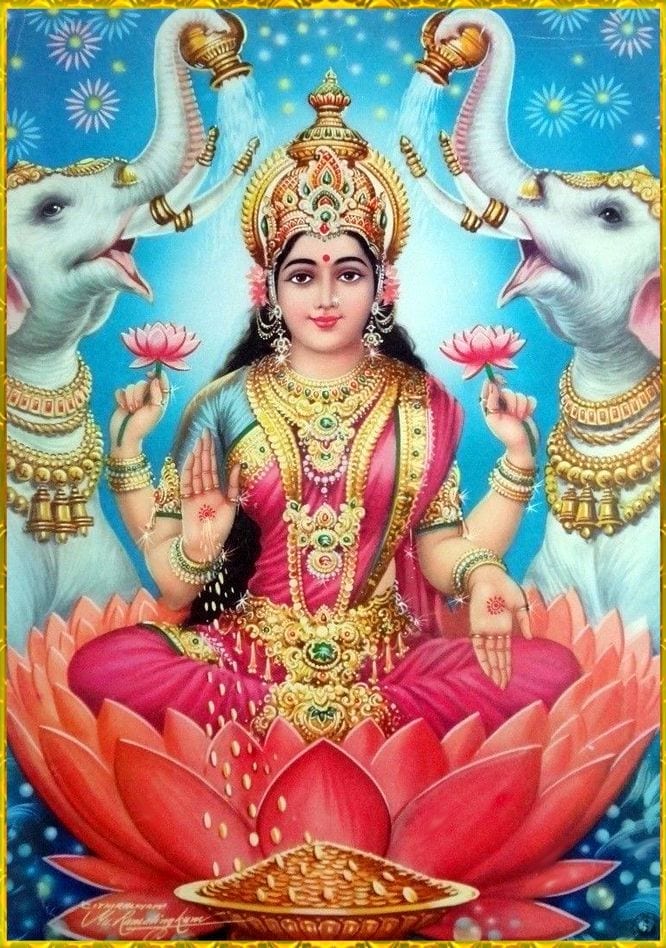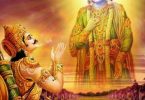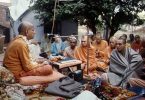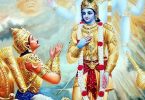Question: Did the Lila where Laksmidevi became Bhrgu Muni’s daughter happen before or after the Lila described in SB 10.89 (Bhṛgu’s testing Lord Viṣṇu, Śiva, and Brahmā)?
Answer by Romapada Swami:
Based on Padma Purāṇa, the advent of Lakṣmī as the daughter of Bhṛgu and Khyāti is an event after Lakṣmī’s arising from the milk ocean during the churning of the milk ocean. And Bhṛgu’s testing Lord Viṣṇu, Śiva, and Brahmā occurred during a prolonged sacrifice performed by Svayambhuva Manu (the first manu). From SB 8.5, it is known that the churning of the milk ocean happened during the sixth manvantara. In this regard, the advent of Lakṣmī as the daughter of Bhṛgu and Khyāti happened after Bhṛgu’s testing Lord Viṣṇu, Śiva, and Brahmā.
According to Sanātana Gosvāmī, Lakṣmī who appeared as the daughter of Bhṛgu is an expansion of original Lakṣmī, the eternal consort of the Lord of Vaikuṇṭha. See Bṛhad-bhāgavatāmṛta 1.3.66 commentary below.
Sanātana Gosvāmī’s commentary
Bṛhad-bhāgavatāmṛta 1.3.66
yā vihāyādareṇāpi
bhajamānān bhavādṛśān
vavre tapobhir ārādhya
nirapekṣaṁ ca taṁ priyam
yā — who; vihāya — leaving aside; ādareṇa — with great respect; api — even; bhajamānān — who are worshiping; bhavādṛśān — persons like you (Nārada); vavre — she chose; tapobhiḥ — by severe penances; ārādhya — worshiping; nirapekṣam — who was indifferent; ca — and; tam — Him; priyam — her beloved.
Ignoring people like you who worship her with great respect, she vowed to undergo severe penances to worship her beloved Lord, even though He was indifferent to her.
Now, the greatness of Lakṣmī’s worship of the Lord with the highest prema, with disregard for all else, is described. The Lord is described as indifferent (nirapekṣam) since he is ātmārāma and full in his desires. The cause of accepting her is her affection for him (priyam). This means that she was dedicated only to him. How did she gain the Lord who is ātmārāma? She worshipped the Lord with austerities or various services, while completely concentrating on him (tapobhiḥ). Plural is used in tapobhiḥ to indicate respect. It is said in the Tenth Canto:
kasyānubhāvo ’sya na deva vidmahe
tavāṅghri-reṇu-sparaśādhikāraḥ
yad-vāñchayā śrīr lalanācarat tapo
vihāya kāmān su-ciraṁ dhṛta-vratā
O Lord, we do not know how the serpent Kāliya has attained this great opportunity of being touched by the dust of your lotus feet. For this end, the goddess of fortune performed austerities for centuries, giving up all other desires and taking austere vows. SB 10.16.36
Though Lakṣmī is the eternal consort of the Lord of Vaikuṇṭha, and does not need to attain him by worship like others, her expansions like the daughter of Bhṛgu (Bhargavī) are described in scriptures as performing penances to attain the Lord. These forms are considered non-different from Lakṣmī in verses like the one quoted above.
+++ +++ +++
Padma Purāṇa, Sṛṣṭi-khaṇḍa – Section on Creation, Chapter 4
The Birth of Laksmi
Bhisma said:
1. I have heard that Lakshmi was born in the white ocean. How did you say that she was born of Khyati from Bhrgu?
87. Then the king of gods protected the three worlds. Thus glorious Laksmi sprang up from the Milky Ocean.
88-90. O great king, this eternal one (i.e. Lakshmi) was again born with great splendour to Khyati from Bhrgu. …
Padma Purāṇa, Section 6 – Uttara-Khaṇḍa (Concluding Section), Chapter 255
Vasiṣṭha said:
7-13. O king, listen; I shall explain to you what you have asked me respectfully. In the pure hearts of men a thought for bliss is produced. Formerly on the best mountain Mandara Svāyambhuva Manu performed, along with sages, an excellent prolonged sacrificial session. There came all sages who had fulfilled their vows, who were proficient in various holy texts, whose lustre was like that of the young sun and fire, who, the brāhmaṇas, were well-versed in all Vedas, and who had mastered all religious practices. When the great sacrificial session took place, the sages whose sins had been exhausted, and who had penance as their wealth, spoke among themselves in order to find the truth about the deity. Which excellent deity should be honoured by brāhmaṇas proficient in the Vedas? Who, out of Brahmā, Viṣṇu and Śiva, being praised, gives salvation to men? Water of (i.e. flowing from) whose feet should be resorted to? So also the purifying remnant of whose food should be enjoyed? Who, the immutable one, is the highest abode, the highest soul and who is eternal? Whose favour and holy place would gratify the manes?
14-20. Such a great discussion took place among those who were seated. Some great sages said: “Rudra alone (is the greatest deity).” Other best sages said: “Brahmā alone is fit to be worshipped.” Other best one said that the Sun alone was fit to be worshipped among the souls. Other brāhmaṇas said: “The immutable lotus-eyed Vāsudeva, the highest one, the one without a beginning or an end (viz.) Viṣṇu alone is the highest lord. He, the best among the deities, deserves to be worshipped.” To them, who were discussing, Svāyambhuva Manu said: “He, the lord, who is full of good nature, who has auspicious qualities, who is lotus-eyed, who is glorious, who is the lord of Lakṣmī, who is the highest Brahman, is the only lord adored by brāhmaṇas, proficient in Vedas. Others mixed with passion and vice are not fit to be worshipped.” Having heard these words of him, all the great sages, joining the palms of their hands, said to the brāh-maṇa, Bhṛgu, the treasure of penance:
The sages said:
21-25. O you of a good vow, you are able to remove our doubt. Approach, O you of a good vow, Brahmā, Viṣṇu and Maheśa. O sage, go near them and observe their bodies. Out of them, he who possesses the pure sattvaguṇa, is alone fit to be worshipped, and never anyone else. He, full of pure sattva, will be friendly to brāhmaṇas. To brāhmaṇas he will be a holy place and a favour. Even to deities and manes the remnants of his food will be purifying. Therefore, O best sage, go to the residence of gods. O lord, O best sage, quickly bring about the welfare of all people.
26-27. Thus addressed, the best sage, along with Vāmadeva, quickly went to Kailāsa where the bull-bannered (god) lived. Having gone near the door of the house of the magnanimous Śaṅkara and seeing very fierce Nandin with a spear in his hand, he said (to him):
28-34. “I, the brāhmaṇa Bhṛgu, have come to see Hara, the best god. Quickly announce me (i.e. my arrival) to the magnanimous Śaṅkara.” Hearing the words of him, Nandin, the lord of (Śiva’s) attendants spoke harsh words to the great sage of an unlimited splendour: “The lord is not in the vicinity. Śaṅkara is sporting with goddess (Pārvatī). O best sage, go back if you desire to live.” Thus repudiated by him the (sage) of a great penance remained there, at the door of the great lord, for many days. “Since he, arrogant due to the company of a woman, thinks lightly of me, he shall have the form of clitoris. Approached (i.e. overcome) by vice he slights me, a brāhmaṇa! Reduced to an impious state, he will not be adored by brāhmaṇas. Therefore, all the food, water, flowers and oblations offered to him will undoubtedly be useless.”
35-40. The very lustrous one, having thus cursed Śaṃkara honoured by the world, said to the very fierce attendant, Nan-din, holding a spear, O king: “May Śiva’s devotees, having ash, phallus and bones be impious and out of the Vedic fold.” The sage, having thus cursed Rudra, Tripura’s killer, went to Brahmā’s world, respected by all people. The very intelligent one, having seen Brahmā, saluted him by joining the palms of his hands. The great ascetic, having saluted him, remained silent before him. Seeing the best sage, Brahmā, possessed of an abundance of rajas did not honour him, the great sage that had approached him. He also did not rise to honour him, nor did he speak pleasing words.
41-45. The lotus-seated (Brahmā) remained there with great majesty. Seeing him with preponderance of rajas, the great sage, the grandsire of all worlds, who was very lustrous, said (these) words to Brahman: “Since you, having preponderance of rajas, are slighting me, therefore, be dishonoured by all people.” Bhṛgu, the brāhmaṇa, having thus cursed the magnanimous Brahmā, respected by the world, suddenly went to Viṣṇu’s residence. The brāhmaṇa, having entered Viṣṇu’s world on the northern coast of the Milky Ocean, and being properly honoured there by the glorious ones remaining there, and not being stopped there, entered the inner apartment.
46-52. Having entered that spotless palace, resembling the sun, he saw Lakṣmī’s lord lying on the bed of the serpent. Both his feet were being rubbed by the lotus-like hands of Lakṣmī. Seeing him, the best sage Bhṛgu, full of anger kicked with his left foot Viṣṇu’s chest. The lord, getting up quickly, and gladly saying, “I am fortunate”, joyfully pressed his foot with his hands. Slowly stroking his feet he spoke (these) sweet words: “O brāhmaṇa-sage, I am fortunate. I am always blessed. Due to the contact of your foot, there will be propitiousness in my body. May the dust-particles from the foot of a brāhmaṇa, which are the cause of the acquisition of affluence, which are the comets to the host of calamities that have come up, which are bridges over the boundless ocean of the mundane existence, purify me. All the holy places like Gaṅgā etc. undoubtedly remain in the body of him, on whose body dust-particles from a brāhmaṇa’s foot always remain.”
53-54. Saying so and quickly getting up with goddess (Lakṣmī), Viṣṇu devoutly honoured him with divine garlands, sandal etc. Having seen him, the best sage, with his eyes full of tears of joy, got from the best seat, and saluted that treasure of compassion. The great ascetic, having joined the palms of his hands, gladly said:
Śrī Bhṛgu said:
55-64. Oh, what a (handsome) form! Oh, (great) tranquillity! Oh, (great) knowledge! Oh, (great) pity! Oh, his patience is spotless! Oh, the goodness of Viṣṇu! Similarly the ocean of virtues has natural, auspicious, goodness. It is not at all present in all other gods. You alone are hospitable to the brāhmaṇas. You alone are the protector. You alone are the highest Brahman. You alone are the lord of brāhmaṇas. No other god is respectable. O Puruṣottama, those who worship any other god than you, have become impious, and are censured by all the world. You, Janārdana, are alone fit to be worshipped by brāhmaṇas, well-versed in the Vedas. None else among the gods is ever venerable. Brahmā, Rudra and others, mixed with rajas and tamas are not fit to be worshipped. You, having pure sattva, are fit to be worshipped by brāhmaṇas. The water (flowing) from your feet should be resorted to by manes, gods, and all brāhmaṇas. It gives salvation, and destroys sins. Manes, gods, brāhmaṇas should take what is left over after you have eaten, and not what is left over after others have eaten. The food, flowers, so also water of (i.e. offered to) other gods, would all be unfit to be touched. It is useless like liquor. Therefore, a wise brāhmaṇa should constantly worship you, the eternal one, everyday and should take water of (i.e. sanctified by) you and food eaten by you.
65-68. A brāhmaṇa should not see another god; should not worship him. He should not partake of another god’s favour; should not enter the sanctuary of any other (god). (If) a man does not give in this world the food and holy water enjoyed by you in the rite of śrāddha offered to his ancestors, all that would be fruitless. His dead ancestors fall into (and live in) the hell of pus and blood for thousands of crores of kalpas and hundreds of crores of kalpas. O master, when one offers an oblation (into fire) or gives (offerings) to deities and manes after offering them to you, there is satisfaction (of deities and manes), (i.e. he satisfies them) and he gets immortality.
69-78a. Therefore, you alone are adorable to gods, and none else. He who, through folly, would worship other (deities) will be impious. You are Nārāyaṇa; you are glorious; you are the ancient Vāsudeva. You are omnipresent Viṣṇu. You are eternal, highest soul and the great god. You alone are fit to be worshipped by brāhmaṇas. You are hospitable to brāhmaṇas. You possess pure sattva. Due to your being venerable to brāhmaṇas and due to your virtue of having pure sattva, obtain the status of a brāhmaṇa among all the gods themselves; for all brāhmaṇas will resort to you, the highest Brahman, alone. They were brāhmaṇas and not others. There is no doubt about this. Devakī’s son is holy. Madhusūdana is holy. The lotus-eyed one is holy. Viṣṇu, Acyuta is holy. Lord Kṛṣṇa is holy. Vāsudeva, Acyuta, Hari (is holy). Narasiṃha is holy. So also is the immutable Nārāyaṇa. Śrīdhara, Śrīśa, Govinda, Vāmana is holy. The Yajñavarāha, Keśava, Puruṣottama is holy. Glorious, lotuseyed Rāma, descendant of Raghu, is holy. Padmanābha is holy. So also Dāmodara, the lord, Mādhava, Yajña, lord Trivikrama is holy. Hṛṣīkeśa is holy; Janārdana, wearing yellow garments (is holy).
78b-87. Salutation to the holy god, to Vāsudeva, holder of the Śārṅga (bow); (Salutation) to Nārāyaṇa, Śrīśa, having lotus-like eyes. Salutation to the holy god, Vāsudeva, Viṣṇu. Salutation to the highest god full of auspicious qualities. Salutation to the holy god, of the form of all gods. Salutation to you having the body of the Boar. Salutation to you, the lord of the triad (of the Vedas). Salutation to the holy god, lying on the bed of the serpent. Repeated salutations to Rāghava having eyes like lotus-petals. O lord, all gods and sages, deluded by Maya, do not know you, the lord of all worlds and a great soul. O revered one. even all those proficient in the Vedas do not know you by your name, form and qualities and your acts difficult to be performed. I, capable of knowing your sattva, suggesting your superiority, have been sent by the great sages; (and therefore) I have approached you. O Keśava, in order to know your character and qualities, I put my foot on your chest. O Govinda, O treasure of pity, forgive it.
Speaking like this, and repeatedly saluting Viṣṇu, and being honoured there by the divine, magnanimous, great sages, Bhṛgu, with his mind delighted, again went to the place of sacrifice having an auspicious name.
88-93. The great sages, having seen the magnanimous one to have come back, rose, saluted him, and duly worshipped him. The best sage told them all that: “O best sages, Brahmā and Śiva, the best sages have preponderance of the qualities of rajas and tamas. They were cursed by me. They are not fit to be worshipped by brāhmaṇas. Śaṃkara enveloped by tamas was cursed by me on the peak of Kailāsa. Viṣṇu full of pure sattva is the ocean of auspicious qualities. Nārāyaṇa is the highest Brahman. (He i.e.) Viṣṇu is the deity of brāhmaṇas. Śrīpati, Viṣṇu, Vāsudeva, Janārdana is holy. Govinda, Hari, Acyuta of lotus-like eyes is holy. O best men, he alone is fit to be worshipped by brāhmaṇas, and none else.
94-97. He who, through folly, would worship another (god) will be impious. Even sinners get salvation just by remembering Kṛṣṇa. The water (flowing) from his feet should be taken. The remnants of the food (offered to) him are purifying. It gives heaven and salvation to men, especially to brāhmaṇas. (A man) should everyday offer an oblation which is (first) offered to Viṣṇu, to the gods. He should also offer it to his dead ancestors. (Then) he gets complete immortality. O brāhmaṇas, the dead ancestors of him who does not offer (food) enjoyed by Viṣṇu, to them at a śrāddha-rite, always eat (and drink) feces and urine.
98-101. Therefore, brāhmaṇas should always eat the remnants of the food offered to Viṣṇu. The remnants (of food offered to other gods) are useless and (therefore) condemned. A brāhmaṇa, weak in knowledge, who even once eats the remnants of food etc. offered to Śaṅkara etc., would certainly be a cāṇḍāla. For thousands of crores of kalpas he is roasted in the fire in hell. O best brāhmaṇas, the remnants of offerings to gods like Rudra, are said to be equal to food offered to demons, yakṣas, goblins and like liquor and flesh. Brāhmaṇas should not eat that food, the offering enjoyed by (these) gods.
102. Therefore, O best brāhmaṇas, leaving another god, worship diligently, till you live, the ancient Viṣṇu only.
103-109. With your doubts removed, endowed with the five purifications like imprinting the body with heated marks, with good hearts, looking upon that as the highest abode of Viṣṇu, properly worship that extraordinary Viṣṇu, O best brāhmaṇas. The brāhmaṇas marked with the disc(-impression) are good and extraordinary. Those without the disc-marks are said to be ordinary and vicious. Therefore, a man should have the heated marks of a disc and a conch at the roots of his arms, which (marks) of (i.e. sacred to) Viṣṇu burn the stream of sins due to contact with ordinary persons. Having had the upright sectarian marks on the body according to the manner prescribed in the holy texts, he should worship Viṣṇu according to the rules with the gem of the hymn (viz. Viṣṇu-sahasranāma). Being diligent he should also partake of the remnants of food offered to him. He should always worship gods at the time of finishing his worship. O brāhmaṇas, knowing him to be the highest lord enjoying all sacrifices, one should always offer (oblations into fire), give (presents to him) and mutter (his names).”
Vasiṣṭha said:
110. All the sages, thus addressed, and with their sins exhausted, saluted Bhṛgu and with the palms of their hands duly joined, said:
The sages said:
111-112. O revered best brāhmaṇa, you alone remove our doubts. You are the refuge ofthe people. O brāhmaṇa, you are the highest asylum. You alone are the best piety. You alone are the highest penance. We shall exist due to your favour, and not -otherwise, O brāhmaṇa.
Vasiṣṭha said:
113-117. All the great sages, having thus praised that brāhmaṇa Bhṛgu, and having got the hymn from him, worshipped Viṣṇu. O best king, I have told all this to you as the occasion has arisen. …
Selected references for Lakṣmī as the daughter of Bhṛgu and Khyāti
Kardama Muni handed over his daughter Kalā to Marīci, and another daughter, Anasūyā, to Atri. He delivered Śraddhā to Aṅgirā, and Havirbhū to Pulastya. He delivered Gati to Pulaha, the chaste Kriyā to Kratu, Khyāti to Bhṛgu, and Arundhatī to Vasiṣṭha. (SB 3.24.22-23)
The sage Bhṛgu was highly fortunate. In his wife, known as Khyāti, he begot two sons, named Dhātā and Vidhātā, and one daughter, named Śrī, who was very much devoted to the Supreme Personality of Godhead. (SB 4.1.43)
205-206. … Khyati, the daughter of Dakshya, gave birth to Dhata and Vidhata; and to Sri, the wife of Lord Narayana. (Padma Purāṇa, Sṛṣṭi-khaṇḍa – Section on Creation, Chapter 3)
The divinities Dhātā and Vidhātā were born to Bhrigu by Khyāti, as was a daughter, Śrī, the wife of Nārāyaṇa, the god of gods). (Viṣṇu Purāṇa, Book I, Chapter XII)
PARĀŚARA.–Lakṣmī, the bride of Viṣṇu, was the daughter of Bhrigu by Khyāti. (Viṣṇu Purāṇa, Book I, Chapter X)
He [Dakṣa, the son of Brahmā] conferred the auspicious Khyāti, matchless in beauty, on Bhrigu. Bhrigu begat on her Dhātā and Vidhātā. He also begat Shrī who was Nārāyana’s wife. (Garuda Purāṇa, Agastya Saṁhitā, Chapter V – Creation of the Prajapatis)







